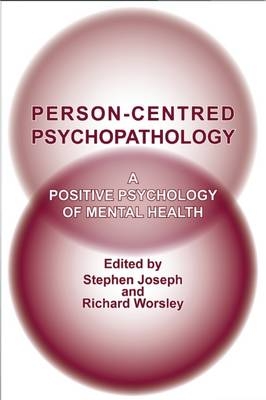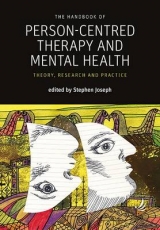
Person-Centred Psychopathology
PCCS Books (Verlag)
978-1-898059-69-1 (ISBN)
- Titel erscheint in neuer Auflage
- Artikel merken
The person-centred approach offers a positive psychological vision of psychopathology. The crux of the person-centred approach is the meta-theoretical assumption that people have an inherent tendency toward growth, development, and integrated and optimal functioning, but that these do not happen automatically. For people to actualize their inherent optimal nature they require the right social environment. Without the right social environment the inherent tendency towards growth can become thwarted and usurped leading instead to psychological distress, and dysfunction. In this book, leading person centred theorists and practitioners from Europe and the United States present their work on facilitating personal growth and positive change in people who are experiencing psychological distress and dysfunction.Contributions cover person-centred thinking on antisocial personality, autism and Asperger's, childhood abuse, maternal depression, posttraumatic stress disorder, psychosis, and people with special needs, as well as theoretical contributions on critical psychology, human nature, existential thinking, the use of assessment and diagnosis, clinical psychology and reflective practice, the role of research, and practical issues related to working within psychiatric settings and the NHS.
This book is an essential resource for all who wish to understand person-centred theory and apply its principles to mental health issues and their own professional practice.
Stephen Joseph is at the University of Nottingham, where he is Professor of Psychology, Health and Social Care and the Convenor of the Counselling and Psychotherapy Cluster in the School of Education He is an HCPC registered health and counselling psychologist, and member of the British Psychological Society's Register of Psychologists Specialising in Psychotherapy. Stephen has edited two books for PCCS: Person-Centred Psychopathology and Person-Centred Practice. Richard Worsley has worked for a number of years as a person-centred counsellor, supervisor and trainer. He is also an Anglican priest. He has a particular interest in process in therapy, in spirituality, in philosophy and therapy, and in therapeutic groups. Richard works at the University of Warwick as a staff and student counsellor. In experiencing high-volume work with people with a wide range of presenting distress, he is even more convinced that people are unique, and process their experience in unique and creative ways. Contributors include: Barbara Brodley, Jerold Bozarth, Elaine Catterall, Catherine Clarke, Mick Cooper, Stephen Joseph, Jacky Knibbs, Leslie McCulloch, Marlis Portner, Gillian Proctor, Pete Sanders, Peter F. Schmid, Lisbeth Sommerbeck, Dion Van Werde, Margaret Warner, Paul Wilkins and Richard Worsley.
Introductions Chapter 1: Psychopathology and the Person-Centred Approach: Building bridges between disciplines Stephen Joseph and Richard Worsley Chapter 2: A Carer's Experience of the Mental Health System Catherine Clarke Chapter 3: Principled and Strategic Opposition to the Medicalisation of Distress and All of Its Apparatus Pete Sanders Theory Chapter 4: Person-Centred Theory and 'Mental Illness' Paul Wilkins Chapter 5: From Self-objectification to Self-affirmation: The 'I-Me' and 'I-Self' relation stances Mick Cooper Chapter 6: Authenticity and Alienation: Towards an understanding of the person beyond the categories of order and disorder Peter F. Schmid Chapter 7: A Person-Centered View of Human Nature, Wellness, and Psychopathology Margaret S. Warner Chapter 8: The Complementarity between Client-Centred Therapy and Psychiatry: The theory and the practice Lisbeth Sommerbeck Chapter 9: Assessment and 'Diagnosis' in Person-Centred Therapy Paul Wilkins Chapter 10: The Concept of Evil as a Key to the Therapist's Use of the Self Richard Worsley Contexts Chapter 11: Facing Psychotic Functioning: Person-centred contact work in residential psychiatric care Dion Van Werde Chapter 12: Antisocial Personality Disorder and the Person-Centered Approach Leslie A. McCulloch Chapter 13: Understanding Post-Traumatic Stress from the Person-Centred Perspective Stephen Joseph Chapter 14: Working with Maternal Depression: Person-Centred Therapy as part of a multidisciplinary approach Elaine Catterall Chapter 15: Living with Pain: Mental health and the legacy of childhood abuse Jan Hawkins Chapter 16: Nine Considerations Concerning Psychotherapy and the Care for People 'With Special Needs' Marlis Portner Chapter 17: Autism and Asperger Syndrome: Person-centred approaches Jacky Knibbs and Heather Moran Chapter 18: Clinical Psychology and the Person-Centred Approach: An uncomfortable fit? Gillian Proctor Research Chapter 19: Searching for the Core: The interface of client-centered principles with other therapies Jerold D. Bozarth and Noriko Motomasa Chapter 20: Client-Centered Values Limit the Application of Research Findings - An issue for discussion Barbara T. Brodley Chapter 21: An Evaluation of Research, Concepts and Experiences Pertaining to the Universality of CCT and Its Application in Psychiatric Settings Lisbeth Sommerbeck Chapter 22: Small-Scale Research as Personal Development for Mental Health Professionals Richard Worsley Conclusion Chapter 23: A Positive Psychology of Mental Health: The person-centred perspective Stephen Joseph and Richard Wo
| Erscheint lt. Verlag | 15.8.2005 |
|---|---|
| Verlagsort | Manchester |
| Sprache | englisch |
| Maße | 156 x 234 mm |
| Gewicht | 544 g |
| Themenwelt | Medizin / Pharmazie ► Medizinische Fachgebiete ► Psychiatrie / Psychotherapie |
| ISBN-10 | 1-898059-69-1 / 1898059691 |
| ISBN-13 | 978-1-898059-69-1 / 9781898059691 |
| Zustand | Neuware |
| Haben Sie eine Frage zum Produkt? |
aus dem Bereich



